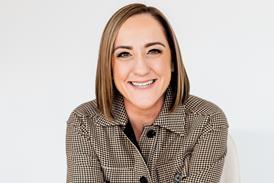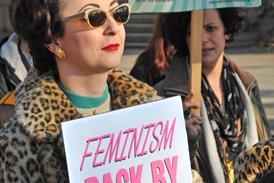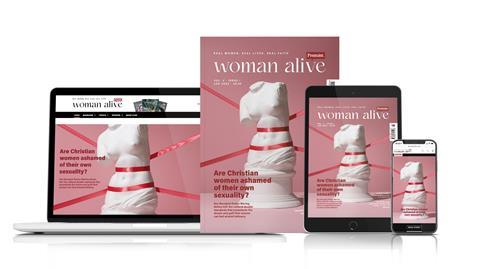
My hobby started a cottage industry in Uganda
When the Rev Sheilagh Williamson met Elizabeth Kiwunga, a young Christian asylum seeker who had fled from Uganda, she had no idea that it would be a life-changing moment. Report by Hayley Liversidge
Elizabeth had become a valued member of the local church congregation and when she needed somewhere to stay, Sheilagh and her husband Rob (also a minister) took her in, with her two infants, Marie and John.
But one morning the UK Border Agency arrived and the young family were sent back to Uganda.
Recalling that time, Sheilagh says, “I always said it would be for a reason. God would have a plan and I promised I would find them.”
Two weeks after Elizabeth had left, Sheilagh flew out to visit her for a week. They kept in touch and an initiative was started in England to raise money to buy some land to build the Kiwungas a house. The children’s school fees were also to be paid.
Sheilagh visited Elizabeth again in 2009 and whilst looking around a Ugandan cathedral, she was invited to visit a village, Kalule, 25 miles north of Kampala. The poverty of the people there made a deep impression on her.
“I was filled with a desire to return,” Sheilagh says. “Fortunately my sabbatical was coming up the following year and so we started making plans for a 14-week visit.
“I had a bit of a panic before going, thinking, ‘What on earth are you doing? What can you do?’ But then I said to myself, ‘You can do the church bit and you can teach’”.
So in 2010 Sheilagh went off to Uganda to see how the family were doing and to help in Kalule. She met a number of women in the village – some married, others who had been abandoned by their husbands – but all facing hardship. There was no decent water supply, little food, an erratic electricity supply and a slow and unreliable internet connection.
On one occasion Sheilagh got out her sewing – packed in haste at the last minute – and a group of women and children began to gather, keen to learn the skill. She started running craft classes and taught them how to make things like patchwork quilts and simple mats. The classes developed into the Together We Can project to help women set up cottage industries and soon the women were making a variety of things, including handmade paper necklaces and bags.
At first, a few handmade items were sold in the UK and the money returned to the women who made them. But as the cottage industry grew in popularity, the merchandise was increasingly sold in Uganda. Now, well over 100 women are involved and the project has become a registered association, with its own bank account and chairperson.
The women now bake oven-baked cakes as well and have started a savings scheme on their own initiative, a bit like a Credit Union.
Through the generosity of people in the UK, sewing machines, money and water filters have all been donated. A hut has been built to act as the project headquarters and to store the equipment. And groups of young people from Britain have travelled to the area to help with plastering and painting the local school.
For the women in the village, the project has changed their lives. “My children are all at school,” said one woman. Another explained: “I now own some land and am building a house.” And a third added: “I am able to look after my parents.”
“Perhaps one of the most important things the work has done is to give the women dignity and confidence,” says Sheilagh.
The project is now working with the boys in the village (at the request of the women and the local bishop) who are being taught how to make sandals out of car tyres and old belts which they can sell at the roadside. At the moment 142 boys are involved, the youngest being eight years old.
Sheilagh is currently planning another visit with a team from the UK, which will include a doctor to give health and hygiene advice, and teachers to support the school work.
Reflecting on how things have developed, Sheilagh says: “It felt like God handed me a baton. I just ran with it.”
Hayley Liversidge works for the Methodist Church as a children & families worker, and writes freelance in her spare time.
I needed some material for my small group
Liz Jennings couldn’t find a publisher for her collection of short stories, but then she used one in her small group and a new kind of book emerged
I have been writing short stories for about 30 years now. I used to write them for women’s magazines like Take A Break, but about 10 years ago, I found myself writing a different kind of story.
Whilst making notes on the sermons in church, I found that a character or situation would come alive to me. It might be a Christian who never prayed in their prayer group or someone finding out that the assumptions they had made about somebody else in church were all wrong, or a prayer for healing that didn’t get answered.
Their stories developed in my head and I had to get them down on paper.
I tried and failed for eight years to get the stories published as a collection, but everyone said: “We like them, but there’s nothing quite like them and nobody knows you, so we don’t know how we’d market them.”
In the end, I gave up. I scrapped a lot of the stories I’d written. And yet, new stories were still coming. I kept writing and praying, but wasn’t sure what the point was anymore.
About this time, my small group, which had just been a cosy twosome, suddenly grew to accommodate three more women. I needed to find some materials for us to use to get to know each other better. I chose a very worthy book, but it got us nowhere. I tried another, and still the group felt stilted. In desperation one week, I decided to try one of my stories.
It was a scary prospect: What if they all thought my story was rubbish? What if they were polite about it and we all felt awkward? I prayed, and braced myself for embarrassment and humiliation. But what happened that night was incredible! The barriers between us melted away as we shared our responses to the story’s characters, and our own experiences.
So each week, I printed off a story and distributed it, and then the five of us read the story, and met up to discuss it and pray around the issues it raised.
I began to write questions to accompany the stories, and added Bible verses and prayer pointers to help us. As we talked and laughed, and occasionally cried, we discovered we had things in common we would never have dreamt of and began to grow closer. It was all so much fun and, better still for me as a leader, so natural and easy!
My small group encouraged me that I mustn’t give up on the idea of publication, so I plucked up the courage to approach a local woman who I’d heard had set up a small publishing company. She really liked them and Short Christians was soon in print. Now I’m running story sessions in local churches and seeing others light up just like my small group did.
Many years ago, a man came to our church to run a prophecy seminar. At the end he prophesied over everyone in the group. To me he said, “God knows the desires of your heart: don’t despise the small things.” This has proven so true to me many times. My life is filled with small things: short stories, small publisher, small groups, but through these small things, God has worked deep changes. I offered my writing to God long ago, and still do on a daily basis, and it’s so exciting to feel that he’s using it in this way.
I just wanted to help others in my community
Mother of four Chantal Shears had limited time and resources, but wanted to help her community. Now she runs The Clothes Horse, a children’s clothes exchange in Cornwall. Interview by Christiana Richardson
I remember clearly being at church one Sunday and praying about how I could help others whilst still looking after my young family, and God ‘showed’ me what I could do,” explains Chantal.
What started two years ago as a small collection of clothes in her loft has now rapidly grown to start filling an industrial unit in Newquay. The scheme has given out thousands of items of clothes to children throughout Cornwall and helped more than 120 families.
Says Chantal: “It just took some confidence to believe in myself that I could run The Clothes Horse whilst bringing up my family. It didn’t take long for people to start bringing donations and also asking for clothes. It was very exciting.”
Donations came from church members across Cornwall, as well as parents from Newquay toddler groups and others wanting to help. Chantal created fliers and set up a Facebook page to reach as many people in need as possible.
“We now hold regular drop-in sessions at our unit once or twice a week,” she explains. “People can come and take as many clothes and shoes as they need for their children. I have discovered that these sessions are also a great way to meet other people in the community, and I really enjoy chatting with them and getting to know all who come.
“Some people tell me their story. One woman told me how she was struggling after losing out on £300 a month since having a baby due to her income being cut. Another family had to go into a safe house after her partner cut up all of their clothes and so she came to us for help.”
Chantal says The Clothes Horse has become so much more than just providing practical help. It is also an opportunity to share God’s love.
“It is a good space to show what church is about. We listen to people’s stories and struggles, and can offer comfort and a listening ear,” she says. “We want people who come to us to feel loved and valued, and that they are special.”
Chantal will often travel to pick up donations or to drop off much-needed clothes to families who can’t get to the industrial unit; but as the ministry continues to grow, she is making sure that caring for her family is her priority. She has enlisted extra volunteers to run The Clothes Horse and limits her social media time to when she is alone.
“From the start I needed to make sure my first priority was to be a present mum to my children and a present wife to my husband,” she says. “I work around them, promoting the Facebook page when they are not around and organising the drop-ins at times when my husband is able to look after the children.”
Chantal has been surprised by the success of the clothing exchange, but gives all the credit to God. “I keep focussed on God and remember that this is his mission which I have been blessed to do. Ultimately I give it to God and listen to what he wants me to do with it as we go forward.”
Chantal has proved that God can use people in whatever situation they are or however busy they think they are. She says: “If you have an idea then just give it a go. Have the confidence to try.
Christiana Richardson is a freelance journalist based in Cornwall
FIND OUT MORE
Interested in finding out more or supporting these ministries?
• For Together We Can, contact Rev Sheilagh Williamson, The Vicarage, 4 Endican Lane, Thornton-Le-Moor, Northallerton DL7 9FB
• For The Clothes Horse, e-mail the-clotheshorse@hotmail.com
• Short Christians: Exploring Faith Together Through Fiction is published by Lioness Writing Limited ISBN 978 0 9934383 94


























